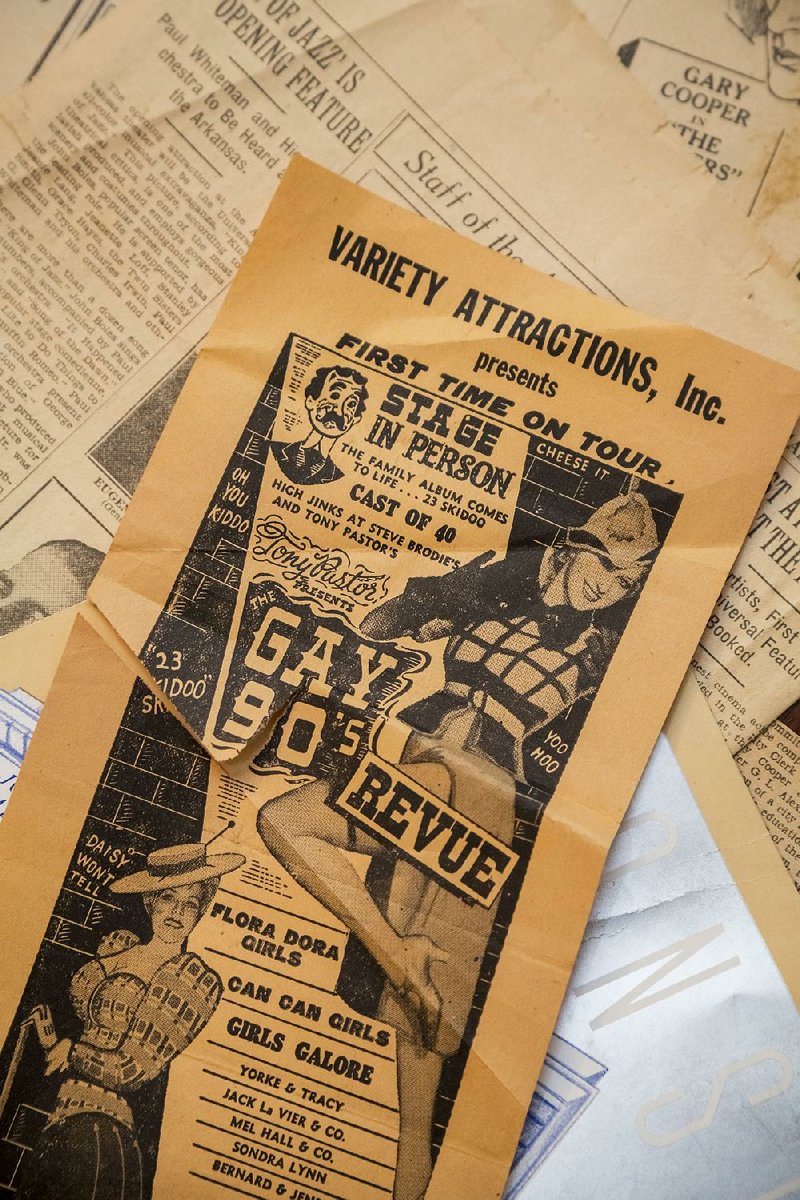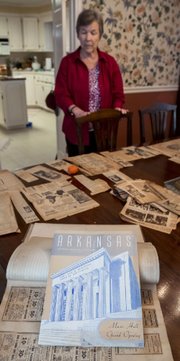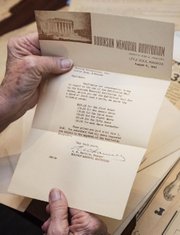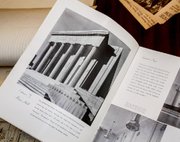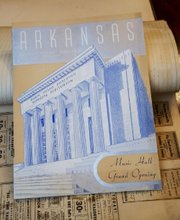Robinson Center in downtown Little Rock, originally dubbed the Joseph T. Robinson Memorial Auditorium, often made headlines before, during and after its recently completed 28-month, $70.5 million renovation. Meanwhile, a few miles west, Joyce Oliver of Little Rock has been perusing the venue's earliest newspaper mentions in now-yellowed clippings -- articles and advertisements collected in her late father-in-law's vintage but never completed scrapbook.
The first performance in the refurbished Robinson was Saturday's Arkansas Symphony Orchestra Opus XXXII annual fundraising gala. In contrast, the events in Eugene T. "Gene" Oliver's scrapbook include a wide array of entertainment, from an acclaimed opera singer and a Hollywood film legend to a gay (mood, not orientation) 1890s revue with Flora Bora and cancan girls to vaudeville acts offering stripteases, exotic dances, and even minstrel shows. Back then, local phone numbers were only four digits, tickets cost a dollar or two and to buy them, patrons could write, phone or send a telegram.
"I inherited the book from my late mother-in-law, Little Rock native Geneva Martin Oliver, who created it for her husband, Gene, who was an entertainment promoter," says Joyce Oliver, 86.
Gene Oliver, a Texas native, began selling candy and tickets in early vaudeville theaters, including the Majestic in Dallas. As a young man, Gene moved to Arkansas to work at another Majestic, Little Rock's first vaudeville theater, which opened in 1905. Joyce Oliver never knew her father-in-law; he died the year before she met her future husband, Rogers "Buddy" Oliver.
A May 9, 1926, article in the Arkansas Gazette announced:
Majestic Theater is 21 years old, Local Playhouse manager who has made rapid rise
In Little Rock the success of the Majestic in recent years is bound up with the career of Eugene T. Oliver, the manager who has won a host of friends in this city. Gene as his friends call him, is only 31, the youngest longtime vaudeville manager in the Southwest. But it is ability and experience that count in the game and he has plenty of both.
In September 1930, the Arkansas Theater opened, with Oliver as a co-manager, and in June 1933, he brought in Flo Ziegfeld's Whoopee, with a cast of 75. But the Great Depression had just begun.
"In the most prosperous times, my in-laws had a maid, a car and a two-story house," Joyce Oliver says. "My mother-in-law used to tell me stories of when, during the vaudeville days, Harpo Marx would come to town and they would have parties at their house and make root beer in the bathtub."
But, she says, the Depression deepened: "That's when movies took over, vaudeville became less popular, and they went from having a maid, a car, and a two-story house to moving to a small house on East Ninth Street downtown."
By 1940 the economy had improved and Gene Oliver had established his own booking agency, Variety Attractions, Inc.
Thumbing through the memorabilia scattered on her dining table, she holds a legal contract and chuckles.
"Here's a contract with A.W. Harville, the manager of Robinson Auditorium, for renting it for regular dances -- $200 for the first use, $175 for the second, and $150 for third," she says, adding she recalls attending basketball games and wrestling matches in the venue.
An Arkansas Gazette article from May 18, 1940, recounts Gene Oliver bringing vaudeville back to the city -- not to the Majestic or the Arkansas, but to the new Robinson:
Vaudeville Premier Pleases
The question of whether vaudeville could make a comeback in Little Rock received an unmistakably affirmative answer yesterday when 5,189 cash customers attended four showings of "Cafe Parisienne," the first of a series of week-end attractions planned at the Auditorium. The cast will give four more performances today, Manager Eugene Oliver says.
"Cafe Parisienne" provided a well balanced menu of mirth and music, spiced with a variety of dancing that included a "Gone With the Wind" strip tease by Rene Villon under decorously subdued lights. Miss Villon also scored with an acrobatic number in which she did a back bend to the floor, retrieving a cigarette, while standing in two chairs.
Beginning the following spring, Gene Oliver, working with a business partner, brought a series of weekend matinee and evening vaudeville shows to the auditorium. The Gazette reported on March 16, 1941:
... Bookings will be handled by firms in Chicago and New York. The New York agency is said to have stars of stage, radio and screen under its direction. Mr. Oliver said the budget allowed the booking offices [to] permit scheduling of the best attractions on the road. Each program will have eight acts, and there will be a 10-piece pit orchestra.
"During the early years of Robinson, a variety of promoters worked with the auditorium staff to book programming into the Music Hall (upper level) and Exhibition Hall (lower level)," says Scott Whiteley Carter, special projects administrator for the city of Little Rock.
The producers of touring performers or shows often sought a local promoter to partner with them and handle advertising, offer a financial guarantee, and contract with the auditorium, Carter explains: "Tickets would often be for sale at local music stores and for most performances, Moses Melody Shop on Main Street served as the de facto box office for Robinson."
Star power
One of the brightest stars gracing Robinson's stage was the Hollywood legend Katharine Hepburn in early 1941.
The ad for her appearance announces:
Katharine Hepburn Coming Here January 16
Katharine Hepburn, model, stage, and screen star, will be here for "The Philadelphia Story" Thursday night, January 16 at the Auditorium.
The wide array of clippings gives a glimpse into entertainment of the past, like ringing in the New Year in 1940:
Little Rock's Gayest New Year's Eve Frolic, cabaret style at Robinson Auditorium, $3.50 per couple, tax included
Dance in the music of George Needer and his orchestra, gala floor show, Giles Shelton, Craig and Browning, Barry Watts & Skeeterbugs.
A small, crowded dance floor will spoil your party, Dance in Spacious Robinson Auditorium -- Tickets at Moses Melody Shop, 303 Main St. New Year's Eve 1940
Robinson also brought in political speakers such as Texas Rep. Martin Dies (the first chairman of the U.S House of Representatives' House Un-American Activities Committee, controversial for its investigations of suspected Communist activity) who gave an address on his book, Trojan Horse in America.
History preserved
By about 1942, after 2 1/2 years of booking shows through Variety Attractions, Gene Oliver dissolved his company and began working as a distribution manager for the Coca-Cola Co. In 1944, he became ill while working in Mississippi.
"He died of ptomaine poisoning from eating potato salad that had gone bad," Joyce Oliver says of what is today known as food poisoning.
After his death, Oliver's widow, in her 40s, returned to work.
"She had true grit; there were times when she worked for just a base salary and wondered where the next evening's meal would come from," Oliver says. "But she scraped by, went to work for Sterling in their corporate office, and climbed her way back up, eventually buying a a house on North University."
It was in the garage apartment of that property where the clippings-filled scrapbook of her late husband's career was kept in a metal filing cabinet on a platform raised off the dirt floor.
"Being in that metal filing cabinet is what saved them."
Joyce's grandson Josh Oliver, looking at the newspaper clippings, is amazed by his great-grandfather's colorful career: "I'm just overwhelmed by it all."
In one from May 1940, an ad for the "Cafe Parisienne" stage show that touts Rene Villon "in her exotic dance 'Gone With the Wind'" boggles the modern-day mind. Especially considering the 2,317 unreserved seats for the show were priced at 25 cents for adults and 10 cents for children. Meanwhile, the neighboring ad announces a show at the auditorium the next night featuring famed black opera singer Marian Anderson, with prices ranging from $1.12 for students to $2.80 for premium seats. Those tickets were sold at Mrs. Frank Vaughan's office at the Woman's City Club (phone 6444) -- for the white fans; black fans had to buy theirs elsewhere. (Colored Patrons Tickets: W.A. Singfield, 616 1/2 West 9th St., Phones 2-4709 and 9660).
In addition to segregated seating, minstrel shows with performers in blackface were once held in the auditorium, Carter says.
"The Kiwanis club fundraiser was a minstrel show there up through the 1960s," he says. "I don't know exactly when those stopped."
Integrating the auditorium
In March 1962, 22 black Little Rock residents filed suit against the city in an effort to desegregate "the public parks, recreational facilities, Joseph T. Robinson Auditorium and all other public facilities of the City of Little Rock," Carter says, adding that the plaintiffs included six doctors and dentists and eight ministers and included then-future state senator Dr. Jerry Jewell and then-Arkansas Democrat writer Ozell Sutton with Wiley A. Branton as their lead attorney, Carter says.
The suit was eventually assigned to U.S. District Judge J. Smith Henley who, on Feb. 13, 1963, announced he would issue a judgment in favor of the plaintiffs. The judgment, issued a few days later, neglected to itemize swimming pools as desegregated, which led to another saga.
As for the early promoter's scrapbook, which includes an original program from Robinson's grand opening on Feb. 16, 1940, Joyce Oliver plans to donate it to the Butler Center for Arkansas Studies, which she hopes will add in the loose clippings and complete the book.
"I still have the personal scrapbooks for my in-laws that my children will inherit," she says. "But this one on my father-in-law's career is a part of Little Rock's history and needs to be where the public can see it."
Style on 11/15/2016
